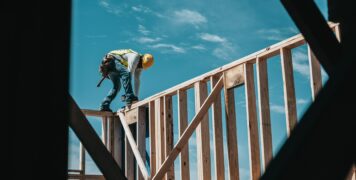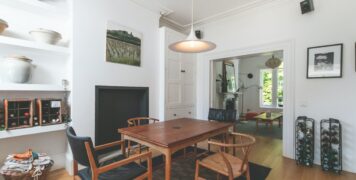Contact
020 7953 7040
info@ccameron.co.uk
Charles Cameron & Associates
Blackfriars Foundry
154-156 Blackfriars Road
London SE1 8EN
Converting a house into flats
February 25, 2023
Information published was correct at the time of writing
Depending on the size of the property, there are several different methods

Increasingly, landlords are taking advantage of the rising popularity of flats by splitting a house into multiple units. The process of converting a house into flats will depend on local planning permission and building regulations, so landlords should always seek professional advice before beginning any work. Depending on the size of the property, there are several different methods for converting a house into flats. For example, single-storey conversions can be achieved through dividing up existing space with stud walls, while loft or basement extensions may require professional help to ensure they conform to local building regulations. Additionally, larger properties with space for multiple two-storey residences could benefit from professional plans to maximise rental income and long-term profits. You need to consider all costs associated with the renovation, such as professional fees and additional materials. You should also be aware of any potential complications that may arise during the conversion process, such as unexpected costs or delays due to planning permission or building regulation issues.
LUCRATIVE AND REWARDING PROPERTY INVESTMENT
Once all necessary paperwork is submitted and approved, you are ready to start your conversion project. Professional contractors and designers can help create a safe and desirable property for tenants, while making sure it conforms to local regulations. By taking the time to properly plan and follow professional advice when converting a house into flats, you can ensure you maximise both rental income in the short term and profits on the sale in the long term. This can help to create a lucrative and rewarding property investment.
RESEARCH THE LOCAL MARKET AND DEMAND FOR FLATS
Start by researching other flats in the vicinity and how long they’ve been on the market. This will give you an understanding of the demand for flats in the area, as well as a good indication of how much rent other landlords are charging. If there are lots of empty properties available, it may be worth considering another neighbourhood instead. You also need to research local amenities and attractions that could make your property more attractive to tenants. Think about what people might want when looking for rental accommodation – such as access to shops, public transport or parks nearby – and consider if your project would provide those features. Knowing what makes renting attractive will help you determine whether building flats is going to be successful in this particular area. Finally, consider the local economy and job market. If there are lots of opportunities for employment nearby, then it’s likely that people will be looking to rent flats in order to live close by. On the other hand, if there aren’t many jobs or prospects in the area, you may find it difficult to keep your properties occupied.
CONSIDER THE PLANNING IMPLICATIONS OF A CONVERSION
When considering the planning implications of a conversion, professional advice should be sought from the local planning department. They will be able to advise whether planning permission is required and, if so, what specific requirements must be met for your proposed development. This can include factors such as minimum flat size, soundproofing between neighbouring flats, insulation for comfort and energy efficiency, fire safety requirements and more. Take into account any such regulations before purchasing a house with the intention of converting it into separate flats. Once you have been given the go-ahead from the local council, an application for Building Regulations should then be submitted and approved in order to begin building work. Failure to follow appropriate regulations may result in unwanted costs or even legal action, so professional advice and guidance should be sought at every stage to ensure the project is completed safely and compliantly.
UNDERSTAND THE APPLICABLE TAX IMPLICATIONS
When converting a house into flats, ensure that you are aware of any applicable tax implications. The amount of profit made from selling or renting the flats will have an impact on how much tax you have to pay, including Capital Gains Tax. The original cost of the property and conversion costs must also be taken into consideration, along with any disposal costs that may occur when selling the flats. Professional advice can help ensure that you are fully compliant with the relevant taxes and avoid any potential penalties. Being aware of your obligations can help save time and money down the line, and it is always advisable to take professional advice before making any decisions.
KNOW WHAT TENANTS ARE LOOKING FOR FROM A FLAT
Consider the size of flats that tenants in the area are looking for when making your decisions – do they opt for one-bedroom or two-bedroom properties? Knowing what potential tenants are after gives you more room to make informed decisions about what kind of flat you’ll be offering and how many your property can accommodate. You should also consider what will entice renters to choose your flats over other properties in the neighbourhood. Having good-quality fixtures, fittings and appliances can go a long way towards making your flats desirable. Since each flat needs a private kitchen and at least one bathroom, you’ll probably need to undergo some major renovations to install the necessary plumbing. Existing baths and kitchens often require updating. You may want to consider investing in energyefficient options such as double glazing, insulation and solar panels, which can help keep running costs down for your tenants. All flats need private entryways, and if there are gardens, they’ll need access to these as well. Consider proximity to parking when working out how residents will get to their flats, and think about adding helpful extras such as secure bicycle storage. Provide professional support for your tenants if you are able to do so. This might include organising the maintenance of communal areas or offering a property management service that can take care of repairs and emergency call-outs. These services will make life easier for your tenants and demonstrate your professional approach to rental management.
CALCULATE THE ASSOCIATED CONVERSION COSTS
Professional architects and engineers will be able to help you with the planning requirements, as well as giving professional advice on how best to design the new space. Depending on the layout of your property, you may need professional input in order to ensure that it meets all safety regulations, both during the construction work and afterwards. Factor in building regulation costs, which will involve submission fees for plans and inspection fees at each stage of the conversion process. As part of this process, professional consultants such as surveyors or electrical contractors may need to be employed in order to carry out inspections. There are many other potential costs associated with a flat conversion project, including materials, labour, scaffolding hire and professional services such as legal advice or professional insurers. As such, it is important to ensure that you have a full and realistic understanding of the likely costs before proceeding with any project. Source quotes from various contractors in order to get an accurate estimate of the total cost. This can help you understand the whole picture of your flat conversion project and ensure that you are not faced with any unexpected costs further down the line. Ultimately, professional guidance and due diligence will help ensure that your flat conversion project is completed successfully and on budget.
IDENTIFY ANY LEGAL BARRIERS THAT MAY APPLY
Consult a legal professional for advice. They can help you identify any legal barriers that may prevent you from carrying out the conversion once the sale is complete. They can also draw up leases for separate dwellings – something that will be necessary if you intend to sell them as individual properties. Doing so will ensure that your plans are legally compliant and that you can maximise your return from the project.
OBTAIN THE RIGHT FUNDING FOR YOUR CONVERSATION PROJECT
Regardless of whether you’re an existing landlord, intending to become a landlord, or an investor, it’s important to know what funding options are available. Finance, bridging loans, mortgages and other services all differ, so you need to understand what’s available to you before committing to your project. When it comes to financing, you need to obtain the right deal and rate that suits your project, as this will be where your profit margin is made from your house conversion to flats. As part of the process, we will provide guidance so that you can compare interest rates and fees of different funding options before making your decision.
Don’t forget, our professional, friendly advisers are on hand to support you and can help you explore all of your options.



